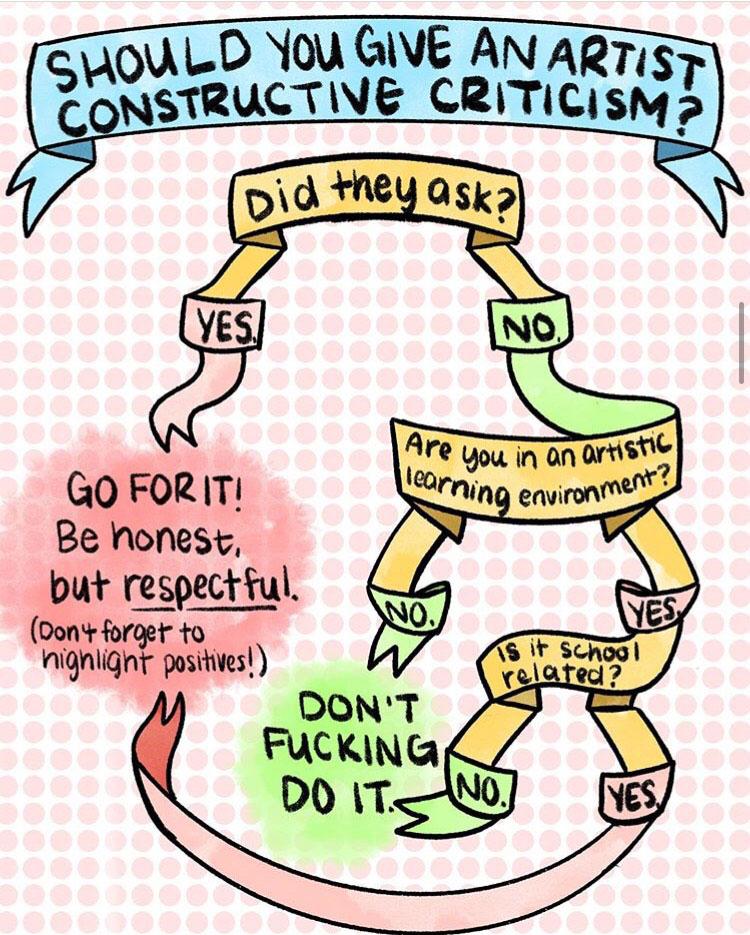
Sharing art on social media has become widely-practiced on platforms like Instagram, Twitter, and Deviantart over the years. This incredibly expansive network for artists to share their work comes with opportunities for those behind the screen to criticize work with no immediate feedback or repercussions from the scrutinized. Not to say that social media platforms cannot be used to connect and interact with other artists or those who are itching to give feedback. Constructive criticism is a good thing in most cases; it helps us grow as artists and gives us important feedback on art pieces. But there are many situations where online criticism can go too far.
Artist @butterflypigment (on Instagram and Twitter) posts doodles and comics to her followers for their enjoyment, but also as a relatable documentation of her day-to-day life. Butterflypigment, also known as Abigail, is an advocate for being respectful and cautious when offering criticism online. She says that Internet users shouldn’t assume the creator wants feedback at all. “Part of offering feedback is ensuring that the creator is receptive to it,” says Abigail. “Imagine if you were to have a conversation with someone. It’s not unheard of to preface any advice with things like ‘Do you want to know what I think?’ or ‘Can I offer you some advice about this?’” She says that by asking permission or keeping negativity to yourself, you’re being a good supporter. “If you want to be rude, I guess nothing will stop you. But I don’t shame folks for speaking up about how they want to be treated.” A basic rule to follow is this: ask the creator if they wish to receive constructive criticism on their piece before commenting on what you personally believe they can improve. If they say yes, go for it. Outline clearly what it is that would improve their work. Give direct and meaningful feedback that doesn’t simply point out weakness or degrade the artist. Try and reflect the conduct that would appear in an educational setting.
Artist and Franklin High School student Sophie Dodd (12) agrees that social media can lead to negative comments from followers who aren’t face-to-face with the artists they are criticizing. “There will always be people who comment that are extremists, and there are no repercussions for being a bad person online because of the anonymity.” Dodd has an art account herself (@avocado.butter on Instagram), and says being unnamed on the Internet can cause excess harshness. “Online people don’t know you, they’re not going to be conscious of who you are as an artist. They might not fully understand your story, or why you’re creating.” This phenomenon of being removed from the person you’re criticizing is an issue on social media, and especially when giving constructive feedback. “If you’re in school [you’re getting feedback from] friends and teachers who know you. [Online] there’s no backstory, there’s no real conversation.”
A sentiment that is widely accepted on the Internet is that by posting something publicly, it is subject to criticism by anyone. While technically this statement is true, that anyone is allowed to comment whatever they want on someone’s post, it is a testament to exactly what is wrong with the brazen anonymity of Internet culture and how it drastically differs from real life. Social media platforms give followers a sense of invisibility and courage when giving unsolicited negative feedback that they might not feel comfortable expressing in a classroom setting or a face-to-face conversation. Without nonverbal cues like facial expressions, eye contact, or tone of voice, it is easy to remove human qualities like emotion from the artist on the other side of the screen. Anonymity on the Internet can be a catalyst to abnormally high amounts of unprovoked criticism, and this type of feedback should not be given without invitation. Artists post their work online at no charge, for their follower’s enjoyment, but also their own. If they don’t want that work criticized, it is best to respect that and stay quiet when it comes to voicing what you think they could improve on. The best course of action if you’re browsing social media and come across something that you believe could use a little feedback: ask if they’re looking, and if they are, proceed with respect and consideration.
The Internet can be a valuable and productive space for those seeking opinions concerning their creative work, especially those looking specifically to improve their technique or receive peer evaluations otherwise only available in an educational setting. It is an incredible community of users, but does not come without downfalls. As Abigail says, “Anonymity on the Internet should not normalize unkind or rude behavior. Even though this is an expected behavior, it should not be an accepted behavior.”

































